Tag: Osinbajo
-
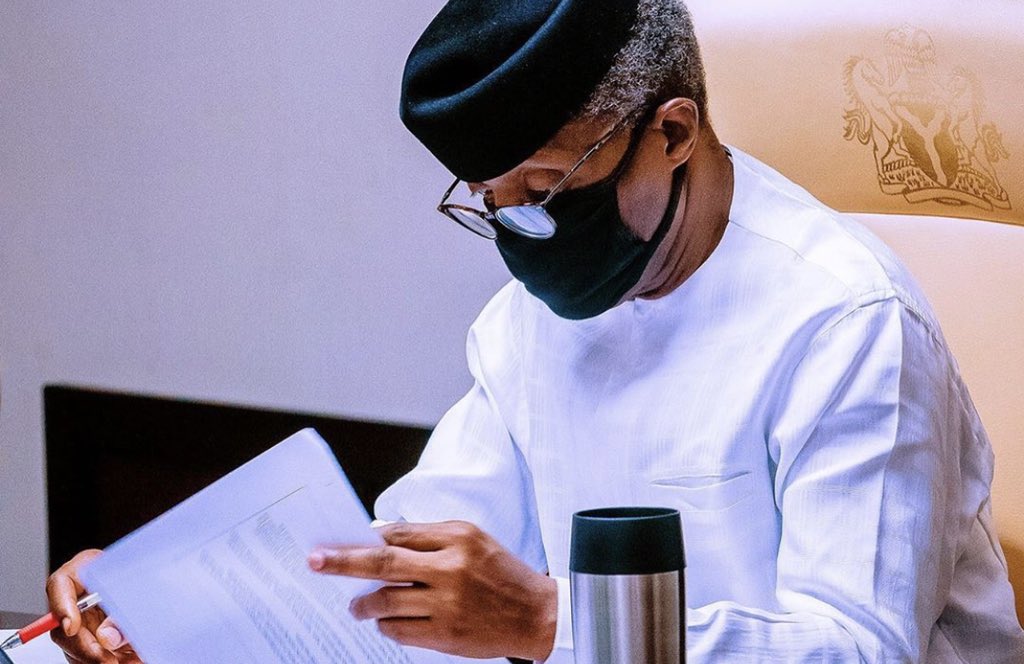
No going back on completion of critical projects in Niger Delta – Osinbajo
Vice President Yemi Osinbajo says the Federal Government will ensure the completion of the critical projects it has embarked upon in the Niger Delta region.Osinbajo’ spokesman, Laolu Akande, in a statement on Tuesday in Abuja said the vice president spoke at the 6th Anniversary Lecture/Niger Delta Awards Organised by Gbaramatu Voice Newspaper in Lagos.The vice president was represented at the ceremony by the Senior Special Assistant to the President on Niger Delta Affairs, Office of the Vice President, Mr Edobor Iyamu.The theme of the event, “The Dwindling State of Crude Oil Demand in the Global Market: The Way Forward”.“In 2017, following my tour of the Niger Delta, which involved extensive consultations with key stakeholders in the region, the new vision for the Niger Delta was birthed in response to the various challenges which had been plaguing our people.“The objective of this new vision is to ensure that the people of the region benefit maximally from their wealth, through promoting infrastructural developments, environmental remediation and local content development.“As part of the quest to expand economic opportunities in the region, this administration has promoted investments in modular refineries.“The objective of this initiative is to address our present energy demands and empower the Niger Delta people through promoting local content.”Osinbajo said that while there were several modular refineries at different stages of completion across the region, three had been completed including the Niger Delta Petroleum Resources (NDPR) Modular Refinery in Rivers; OPAC Modular Refinery in Delta and Walter Smith Modular Refinery in Imo.He said the ongoing remediation exercise in Ogoni land, Rivers, was kick-started by the present administration under the recommendations of UNEP.“It is important to note that the Ogoni clean-up is the first of its kind in the history of the Niger Delta.” Indeed, this is the first time the Federal Government is directly involved in remediation activities within the region.“We are equally committed to expanding infrastructure in the region, this includes the ongoing construction work on the 34-km Bonny-Bodo Road/Bridge, which has been abandoned for decades.“When completed, the project, which was flagged off in October 2017, will connect several major communities and boost socio-economic development in the region.”Osinbajo said that the Itakpe-Ajaokuta-Warri Rail Line project, which was commissioned by the president in September, and had the capacity to handle both passengers and freight services, was connecting several communities and promoting commerce within the region.According to him, the Federal Government is also developing a number of deep sea ports across the region, including the Bonny, Warri, and Ibom Deep Sea Ports, among other development projects such as the establishment of Export Processing Zones to boost economic activities.He said that in 2018, the National Universities Commission (NUC) approved the commencement of undergraduate degree programmes at the Nigerian Maritime University in Okerenkoko, Delta, which happened to be situated in the great Gbaramatu Kingdom.“Beyond its oil wealth, the Niger Delta region is incredibly blessed with diverse human capital across education, sports, technology, creative arts, entertainment, economy, and many other sectors.”The vice president said that factors such as the decline in demand for crude oil, the impact of the COVID-19 pandemic on global energy demand and on government’s earning, the current situation, required creative and holistic approach to foster economic growth.He said that in spite of the fact that crude oil accounted for about 90 per cent of Nigeria’s foreign exchange earnings, the Federal Government from inception had shown a commitment toward the creation of economic opportunities for Nigeria’s population in a post-oil future.The vice president highlighted initiatives being taken by the Federal Government to reposition Nigeria’s economy by taking advantage of global trends in the energy sector.“This includes the SolarPowerNaija Programme under the Economic Sustainability Plan (ESP) which will complement efforts toward providing affordable electricity access to 5 million households, serving about 25 million Nigerians in rural areas and under-served urban communities nationwide,” he said.The vice president also highlighted efforts by the Federal Government on energy transition from crude oil to natural gas, as well as its National Gas Expansion Programme, also a component under the ESP.Osinbajo commended the publishers of Gbaramatu Voice Newspapers for organising the event.According to him, the cumulative effect of all the measures will have a positive transformational impact on the Niger Delta and on the future of the nation as a whole, while ensuring sustainable peace and progress in the region. -
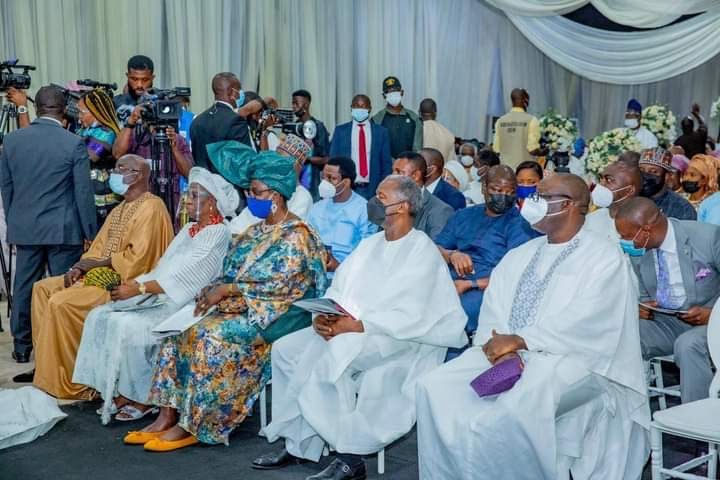
Osinbajo, Jonathan, Fayemi, others attend Gbenga Daniel daughter’s wedding
Top political officials and other prominent Nigerians from all walks of life, on Saturday identified with the former Governor of Ogun State, Otunba Gbenga Daniel at the Holy Matrimony of his daughter, Kehinde Abioye Daniel and her husband, Adebola Tokunbo Williams.

The ceremony which was held at the Federal Palace Hotel, Victoria Island, Lagos, witnessed the presence of prominent Nigerians including the Vice President, Professor Yemi Osinbajo; former President, Dr Goodluck Jonathan and his wife, Patience Jonathan.
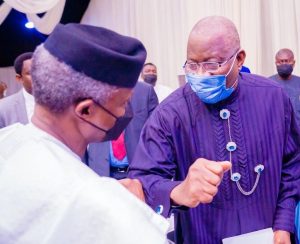
Others in the event include Ondo State Governor, Arakunrin Oluwarotimi Akeredolu, and Ekiti State Governor, Dr.Kayode Fayemi and others.
Preaching during the holy matrimony, the Prelate of the Methodist Church of Nigeria, His Eminence, Dr Samuel Chukwuemeka Kanu counselled the newly wedded couple to toe the path of God in order to enjoy a successful marriage.
Other dignitaries at the Church Service included Pastor Tunde Bakare, Hon Minister of State for Health, Sen.Olorunimbe and several others.
-
![[Video] Group launches Osinbajo’s 2023 presidential bid](https://thenewsguru.ng/wp-content/uploads/2016/10/yemi-osinbajo-VP.jpg)
[Video] Group launches Osinbajo’s 2023 presidential bid
The Osinbajo Grassroots Organisation, OGO, has declared that the Vice President, Yemi Osinbajo, is the future of Nigeria.
The group in a video released and obtained by TheNewsGuru.com, TNG highlighted the characteristics of the Vice President saying he deserves to take over from his boss, President Muhammadu Buhari in 2023.
OGO’s National Convener, Foluso Ojo in a statement he signed and issued in Abuja said the Vice President has at several instances displayed his competence and ability to govern Nigeria.
According to Ojo: “We have identified in the Vice President a leader of unimpeachable character; someone who can continue on the good works already started by President Muhammadu Buhari.
We do not want Nigerians to gamble with this very important decision to pay attention to only politicians, when as stakeholders, we as the youths of this country, can also identify a man with required competence, character and passion to move the nation forward.
“At different occasions, Prof Yemi Osinbajo has demonstrated that he possesses the unique competence, fairness, accommodation, tolerance and respect for the rule of law to carry everyone along as critical stakeholders in the Nigerian future.
“So, we do not need him or anyone to tell us that Prof Osinbajo is a pathway to Nigeria’s future from 2023.”
Ojo said Osinbajo, who, after working diligently with the President to jointly implement policies and programmes for a period running to eight years, should accept an appeal to consolidate on the good initiatives of the administration for enhanced values, unity and development of Nigeria.
OGO also disclosed that the second edition of ‘Osinbajo Day,’ a day set aside to celebrate the Vice President, will hold on Sunday, August 8, 2021.
-
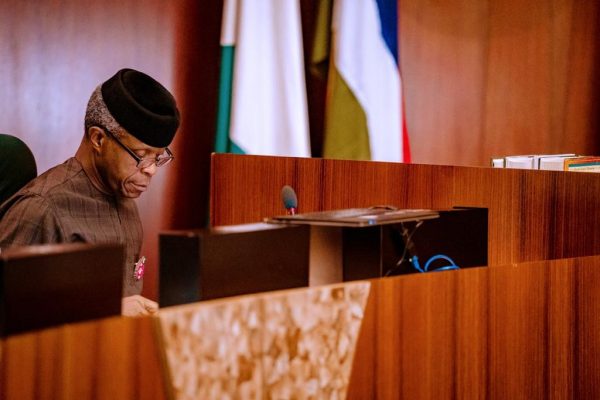
VP Osinbajo presides over FEC meeting
Vice President Yemi Osinbajo on Wednesday presided over a virtual meeting of the Federal Executive Council (FEC) at the Presidential Villa, Abuja.
President Muhammadu Buhari is in London, UK, for a medical check-up after participating in the Global Education Summit on Financing Global Partnership for Education (GPE) 2021 to 2025.
Ministers physically present at the virtual FEC meeting included Lai Mohammed, Minister of Information and Culture, Abubakar Malami, Minister for Justice and Attorney-General and Timipre Sylva, Minister of State for Petroleum Resources.
Others were, Hajia Zainab Ahmed, Minister of Finance, Budget and National Planning, Rotimi Amaechi, Minister of Transportation, Chukwuemeka Nwajiuba, Minister of State for Education.
More so, Minister of Power, Sale Mamman, and Minister of Agriculture and Rural Resources, Sabo Nanono.
Boss Mustapha, Secretary to the Government of the Federation and Ibrahim Gambari, Chief of Staff to President are also in attendance.
At the last meeting on July 14, FEC approved N8.6 billion for the construction of vaccine laboratory, text kits for HIV/AIDS and procurement of medical equipment.
-
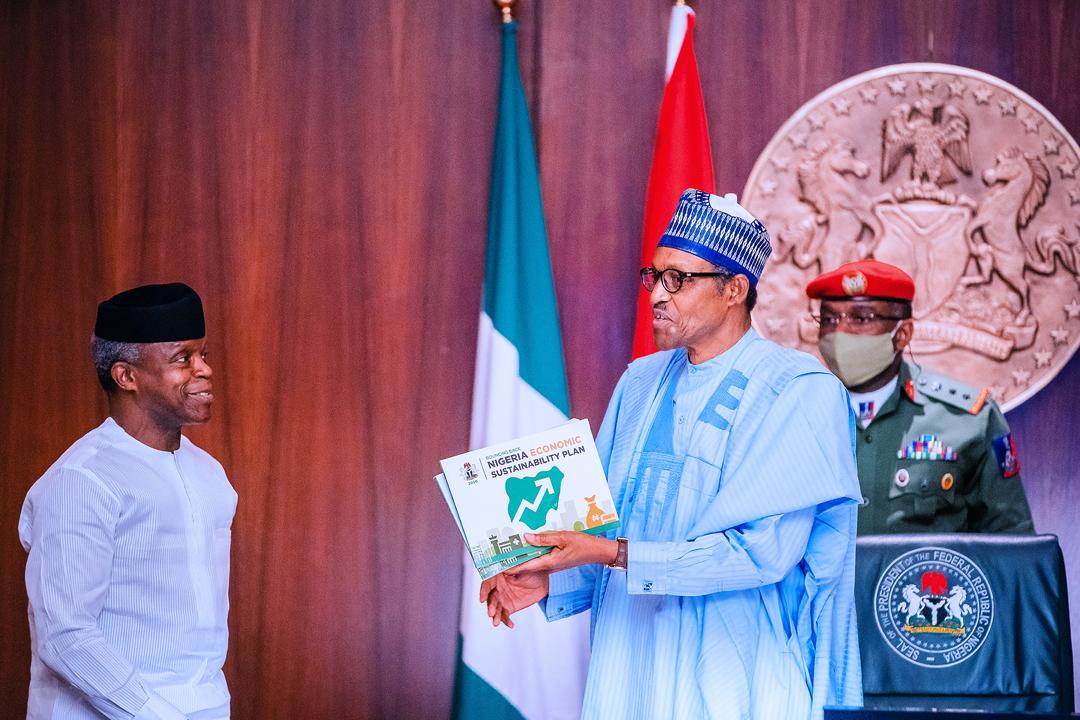
Supreme Court verdict: Buhari rattled by possible fallout from APC congresses, gives matching orders to Osinbajo
President Muhammadu Buhari appears not to be taking the recent judgement of the Supreme Court judges which narrowly upheld the election of Rotimi Akeredolu as Ondo State governor lightly.
TheNewsGuru.com, TNG reports that Akeredolu’s major rival and candidate of the Peoples Democratic Party (PDP), Eyitayo Jedege had challenged Akeredolu’s victory from the Tribunal up to the apex court which delivered judgement in favour of Akeredolu on Wednesday.
However, since the judgement was pronounced, there had been fireworks within the ranks of the ruling All Progressives Congress (APC) and the legality of the Governor Mai Mala Buni of Yobe State led Caretaker Committee of the party and the powers to conduct ward congresses scheduled to commence from today (Saturday).
This perhaps led President Buhari to direct Vice President Yemi Osinbajo to meet with all ministers who are lawyers in his cabinet.
TNG gathered that sequel to Buhari’s directive, Osinbajo summoned a session with the Attorney-General of the Federation and Minister of Justice, Mallam Abubakar Malami (SAN), Works Minister Babatunde Fashola (SAN), Minister of State for Labour and Employment Festus Keyamo (SAN) and Information and Culture Minister Lai Mohammed.
The session debated the status of the CECPC chairman and whether the party should proceed with the ward congresses beginning today.
Buhari was awaiting a feedback from the Vice President to enable him give a clear directive.
A reliable source said the majority of participants at yesterday’s session “spoke in the right direction and supported the suspension of the congresses in order to avoid any consequence on the party’s fortunes in 2023.
“They also favoured a proposal to ask Buni to step aside in the light of the judgment.
“But Malami at the meeting said there won’t be any legal or constitutional obstacles if Buni leads the caretaker committee to conduct the congresses. They were of the strong opinion that the judgment does not affect the status of Buni or APC.
“Those concerned also pleaded that Buni should not be disgraced out of his seat. They demanded an ingenuous way of resolving the aftermath of the judgment of the Supreme Court.”
Responding to a question, the source added: “The VP is expected to get back to the President on the aggregate opinion of the meeting. Although the President mandated him to take appropriate decision, he will still defer to the number one leader.”
The President was yet to take his final decision at press time.
It was also gathered that there had been no communication between the Vice President and Buni on the next step by the party.
However, Buni, in a statement through his Director-General for Press and Media Affairs, Mamman Mohammed, insisted that the Ward Congresses would go ahead.
He pleaded with APC members nationwide to be peaceful during the congresses.
He asked members to “place the party and members interest above personal interests” and warned that the APC would “not hesitate to take decisive measures against anyone who deliberately sabotages the congresses.”
“We have come a long way repositioning the party. We have reconciled many groups and individuals. We must not allow personal interests in this election to divide us and draw us back,” he said.
-

Federal Govt tackling inflation, food insecurity – Osinbajo
Transforming Africa’s food system is an obvious task requiring the active mobilisation and prioritisation of both public and private investments, says Vice President Yemi Osinbajo (SAN).
This explains the resolve of the Federal Government of Nigeria in complementing existing development plans, sectoral strategies, and prioritising investments in specific innovations and technologies to transform food systems in the country.
Prof. Osinbajo in a statement by his media aide, Laolu Akande, stated this on Tuesday in his remarks delivered virtually at the preparatory meeting of the United Nations Food Systems Summit 2021.
The pre-summit was a prelude to the culminating global event scheduled for Rome, Italy in September, 2021, an event the Vice President described as crucial just as the previous dialogues held in several countries on food systems.
Sharing insights on Nigeria’s efforts, the Vice President noted that, “the Nigerian Government is committed to addressing the drivers of food insecurity such as food inflation, changing consumption patterns and climate change, amongst other things.
“At the same time and as an outcome of 40 different food systems dialogues in which up to 5,000 people participated, Nigeria is prioritizing investments in specific innovations and technologies to scale up and transform food systems.
“These actions complement existing development plans and sectoral strategies such as our Economic Recovery and Growth Plan, the National Policy on Food and Nutrition, and the National Policy on Food Safety.”
Continuing, Prof. Osinbajo said, “a specific aim of our recently launched National Poverty Reduction with Growth Strategy is to address hunger, malnutrition and poverty as part of our target of lifting a hundred million Nigerians out of poverty within a decade.”
Osinbajo explained that at the heart of Nigeria’s post-COVID-19 response is the Economic Sustainability Plan, noting that the “plan has a major component, which is the Agriculture for Food and Jobs Programme (AFJP) where we seek to leverage suitable technologies to build a resilient food system for Nigeria.
“Our Nutrition Policy addresses the issues of sustainable and nutrition-sensitive food systems – and the country has prioritized key nutrition actions that are impactful, cost-effective, scalable, and sustainable.
“An integral part of our food systems’ transformation strategy is to create an enabling and supportive environment to implement these policies in a participatory manner involving farmers, investors and State Governments,” the VP added, assuring significant improvements in crop yields, affordable and healthy diets, among others.
Making a case for initiatives that support Africa and other developing countries, Prof. Osinbajo said, “for example, when, as in our country and several others, population growth exceeds growth in national income, food supply would not meet the needs of people, especially when distribution systems are inequitable.”
According to him, “post-harvest losses in Africa, and particularly in Nigeria, are more than 20% of production for several food groups. And this is due mainly to poor storage, poor rural infrastructure and non-automation of food processing, amongst other things.
“The situation in many African countries is given increased urgency with the impact of the COVID-19 pandemic, which has led to growing levels of acute food insecurity. This is of great concern to all of us, especially if we recall that prior to the pandemic, the prevalence of severe food insecurity was as high as 22%.”
Acknowledging the work done by Nigeria earlier in her remarks, the United Nations Deputy Secretary-General, Amina Mohammed, said: “let me commend the effort of my home country, Nigeria, especially the Vice President, for leading six ministers including the Minister of Finance, in the dialogues and other efforts aimed at building sustainable food systems in the country.
“Food unites us all, as families, as communities, as cultures and as humanity, now let’s use it to unite around the urgency and the actions that are needed to transform our world by 2030.”
She added that the summit was designed to guide national governments and other stakeholders looking to leverage their food systems to support the SDGs, noting that food systems play a central role in building a fairer and more sustainable world.
Aside from VP Osinbajo and Mrs Mohammed, participants at the second day of the preparatory meeting included the Prime Minister of Italy, Mr Mario Draghi; Nigeria’s Minister of Finance, Hajiya Zainab Ahmed; Ministers representing India, Canada, China, Norway, Egypt, amongst many other countries.
-
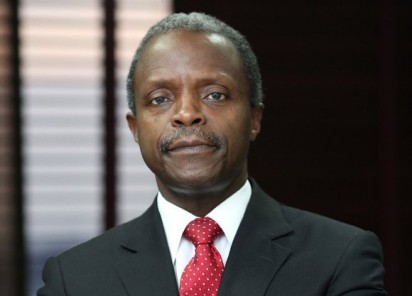
Osinbajo wants judiciary to embrace technology, innovation
Vice President Yemi Osinbajo says the Nigerian judiciary must embrace technology and innovation for efficient service delivery.
Osinbajo said technology was imperative for the evolution of the profession and national development.
The vice president disclosed this in a statement by his spokesman, Laolu Akande, on Monday in Abuja.
He said when he delivered a pre-recorded speech as guest speaker at the 2021 Annual Law Week of the Nigerian Bar Association (NBA) Lagos Branch.
The theme of event is, “Disruption, Innovation and The Bar.”
Osinbajo said that technology and innovation would ensure that the country’s justice delivery mechanism was run on a system of enforceable, discernible laws and efficient institutions.
The vice president said that the country’s justice delivery system could support critical investments in the current dynamic economy.
“Questions also need be asked about the readiness of our profession to engage in new markets as presented by the African Continental Free Trade Area(AfCTA).
” Already Nigerian Banks and financial services are crossing borders in Africa, acquiring banks in several African countries.
“So, the AfCTA will open new trans-border commercial opportunities, and our profession should pay attention to the rules of engagement for legal services and how they may propel our business.”
According to the vice president, innovation in Nigeria’s legal profession requires urgency to fit into the world which thrives on knowledge economy and jobs are threatened by digitisation and Artificial Intelligence (AI).
He cited the example of how continuous improvement in the quality of smartphone cameras disrupted global sales of digital camera.
“AI is commonly used to perform tasks such as legal research and due diligence, document and contract review, and the prediction of legal outcomes – these are tasks that would have been performed by lawyers.
“With the continuing progress in technology, it is only a matter of time before the time capsule catches up with us in Nigeria.”
He called for continuous improvement in the institutional capacity of judges, court registries, court staff, and court infrastructure.
Osinbajo said that as digitalisation had already disrupted other industries, it was possible to predict that AI would go further and disrupt the business model of the legal industry.
“For example, the AI legal service called ROSS is an AI system that can research and offer legal opinions about questions that may be posed by lawyers.
“And ROSS is then able to provide an answer; a properly considered legal opinion, taking into account the case laws and statutory authority in order to be able to come to that conclusion.
“So, providing predictive legal opinion is no longer the exclusive domain of lawyers, and as the years go by, it will become even more so.
“We are part of the global marketplace for investment and legal services.
“So, the extent to which we can attract business to our country depends in part upon investor perception of the quality of our justice delivery system; If we are seen as inefficient and ineffective, we would lose out to more efficient systems.”
On the issue of delay in the country’s justice delivery process, Osinbajo said that the country’s judiciary ought to find ways to tackle jurisdictional challenges, particularly delays in court judgments, among others.
“I argued an appeal at the Court of Appeal in 2013, only to learn yesterday as I discussed with former colleagues in the law firm where I worked, that the appeal at the Supreme Court is not even listed to be heard in 2021.
“As someone said; our problem is not access to justice, it is exiting the justice system with some credible result.
“Should we not be evolving a cost award system that recognizes the court as a finite public resource, and as such delays and other dilatory tactics are visited with deterrent costs?”
The vice president said that the Law week, as well as future engagements, provided an opportunity for some reflections by legal practitioners.
He suggested a hybrid approach to legal education in the country and urged the association to consider how innovation in technology would impact on legal education in the future.
“Even mock trials can be more effectively done online and courtroom processes can be put on videos and re-watched several times by students. Of course, we may still retain court and chamber attachments,” he said.
-

COVID-19 Third Wave: Osinbajo-led NEC speaks on fresh lockdown
The National Economic Council (NEC) on Thursday assured that there was no indication of an imminent lockdown, as the nation braces up for COVID-19’s third wave.
Gov. Babajide Sanwo-Olu of Lagos State, stated this in a briefing to State House correspondents after the virtual NEC meeting presided over by Vice President Yemi Osinbajo, at the Presidential Villa, Abuja.
Sanwo-Olu said the vice president had assured that NEC would convene an emergency meeting on the COVID-19 third wave, whenever the need arose.
The World Health Organisation (WHO) had warned of the spread of COVID-19’s Delta variant, alongside the inconsistent use of proven public health measures which, it said, was driving increases in both case numbers and deaths.
“We will be reviewing on a weekly basis, like every two to three days, what the trends are; the chairman of the council has also mentioned to us that if there is a need for an emergency meeting, he will call one.
“But, assurances were given by the NCDC and the Presidential Task Force, working with relevant states like Lagos, to be tracking and monitoring what is happening almost on daily basis.
“So, we do not think that we are there; we do not have any indication that we will get there; so we are preparing ourselves to ensure that as much as possible, we can very quickly flatten the curve’’, Sanwo-Olu said.
The governor added that Dr Chikwe Ihekweazu, Director General, NCDC, had provided a global insight of what had been happening in the past one month, with Nigeria having 168, 552 cases reported as at July 15, and 1,993 active cases.
States had discharged over 140, 000 people, while only 2,124 deaths were recorded so far, the governor quoted the NCDC as saying, in addition to the fact that the positivity rates had gone up, in spite of the low number of cases in the country.
Sanwo-Olu said Ihekweazu informed NEC that Lagos State had the highest burden of 70 per cent to 80 per cent of the cases in the country, having recorded increases in the number of cases since 10 weeks ago.
“In the last two weeks, we have seen an increase from a positivity average of about 1.5 per cent to positivity average nationally of about 3.5 per cent; Lagos has seen a positivity of 5.5 per cent in the last two weeks; so Lagos, Rivers and Kwara from the report have seen increases in positivity rates.
“It is important for us to know that the Delta variant, which is the new variant, is also in our country and has also been identified in a total of 103 countries globally.
“The Delta variant is 60 per cent more transmissible than the Alfa variant; so, we are watching all the trends and the NCDC and Lagos will be working collaboratively,’’ Sanwo-Olu said.
Meanwhile, Hajia Umar Farouk, Minister of Humanitarian Affairs, Disaster Management and Social Development, had confirmed making a presentation to the council on Flood Risk Management Plan, 2021.
-
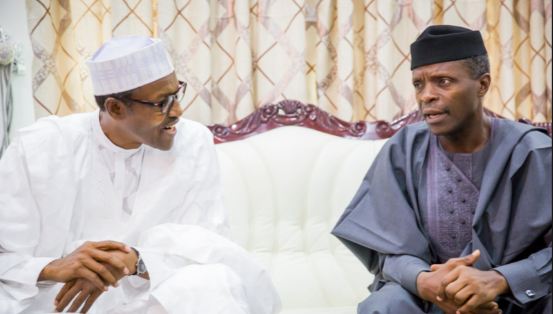
SERAP drags Buhari, Osinbajo, 36 governors, NASS members to court; seeks slashing of jumbo pay allowances
Socio-Economic Rights and Accountability Project (SERAP) has asked the Federal High Court in Abuja “to order the Revenue Mobilization Allocation and Fiscal Commission (RMAFC) and the National Salaries, Incomes and Wages Commission (NSIWC) to perform their statutory functions to review downward the remuneration and allowances of President Muhammadu Buhari, Vice-President Yemi Osinbajo, 36 governors and members of the National Assembly.”
SERAP is arguing that “slashing jumbo pay for these high-ranking political office-holders would reduce the unfair pay disparity between political officer holders and judicial officers, address the persistent poor treatment of judges, and improve access of victims of corruption to justice and effective remedies.”
In the suit number FHC/ABJ/CS/658/2021 filed last Friday, SERAP is seeking: “an order of mandamus to direct and compel the RMAFC to send its downward review of the remuneration and allowances of these high-ranking public office holders and recommendations to the National Assembly for appropriate remedial and legislative action, as provided for by the Nigerian Constitution 1999 [as amended].”
SERAP is also seeking “an order of mandamus to direct and compel the RMAFC to perform its mandatory constitutional duty to urgently review upward the remuneration, salaries and allowances, as well as the conditions of service for Nigerian judges.”
Joined in the suit as Respondents are Senate President, Ahmad Lawan; Speaker of House of Representatives, Femi Gbajabiamila, for themselves, and on behalf of all members of the Senate and House of Representative; and the National Judicial Council.
SERAP is arguing that: “While high-ranking political office-holders continue to enjoy lavish allowances, including life pensions, and access to security votes, which they have powers to spend as they wish, the remuneration and allowances of judges are grossly insufficient to enable them to maintain themselves and their families in reasonable comfort.”
According to SERAP: “The huge pay disparity between these high-ranking political officer-holders and judges is unfair, unjust and discriminatory, especially given the roles of judges to the people and the country.”
SERAP is also seeking “an order of mandamus to direct and compel NSIWC to perform its mandatory legal duty to urgently examine, streamline and recommend upward remuneration and allowances of Nigerian judges, and to recommend downward review of allowances of President Buhari, Vice-President Osinbajo, 36 governors and lawmakers to the National Assembly.”
The suit filed on behalf of SERAP by its lawyers Kolawole Oluwadare and Ms Adelanke Aremo, read in part: “the remuneration and allowances of judges have fallen substantially behind the average salaries and allowances of high-ranking political office-holders such as President, Vice-President, governors and lawmakers.”
“While government reviewed upward the salaries and allowances of political office holders on four occasions between May 1999 and March 2011, the salaries and allowances of judicial officers were only reviewed twice during the same period.”
“The review of the remuneration, allowances, and conditions of service for political, public and judicial office holders carried out by the RMAFC in 2009 shows huge disparity between the remuneration and allowances of judges and those of high-ranking political office-holders.”
“The NSIWC in a letter to SERAP admitted that it has powers to examine, streamline and recommend the salary scales applicable to each post in the public service but informed us to redirect our request to the RMAFC.”
“There is a legal duty upon the RMAFC to urgently review downward the remuneration and allowances of high-ranking political office-holders.”
“Judges should get all to which they are reasonably entitled, and it is unfair, illegal, unconstitutional, and discriminatory to continue to treat judges as second-class people while high-ranking political office-holders continue to enjoy lavish salaries and allowances.”
“Despite their important roles and responsibilities, Nigerian judges are poorly treated, particularly when their remuneration, salaries, allowances, and conditions of service are compared with that of political office-holders. Judges should not have to endure the most poignant financial worries.”
“The increase in the cost of living and the injustice of inadequate salaries bears heavily on judges, as it undermines their ability to effectively perform their judicial functions.”
“The roles and functions performed by judges across the country are second to none in their importance, including in facilitating access of victims of corruption and human rights violations to justice and effective remedies.”
“As a safeguard of judicial independence, the budget of the judiciary ought to be prepared in collaboration with the judiciary having regard to the peculiar needs and requirements of judicial administration.”
“The remuneration and pensions of judges must be secured by law at an adequate level that is consistent with their status and is sufficient to safeguard against conflict of interest and corruption.”
“Nigerians would continue to bear the brunt of denied access to justice, a better judiciary and a better administration of justice until judges across the country are paid what they rightly deserve.”
No date has been fixed for the hearing of the suit.
-

Osinbajo reveals how Buhari-led govt intends to lift 100m Nigerians out of poverty
Vice President Yemi Osinbajo on Friday said the President Muhammadu Buhari administration will adopt a simple and common-sense approach to lift 100 million Nigerians out of poverty in the next ten years.
Expressing the strong hope that this way, the Committee will be able to achieve rapid progress, Prof. Osinbajo said “in order not to make this merely, another of those high-sounding committees that eventually achieve nothing, government has to be very intentional about the objectives and how to achieve them.
Osinbajo stated this in Abuja on Friday at the inaugural meeting of the National Poverty Reduction with Growth Strategy Steering Committee held at the Presidential Villa.
Addressing members of the committee, Osinbajo said government would adopt a different and more effective approach in actualizing the objective of eradicating poverty in the country for the sake of delivering results.
According to him, “I really want us to approach this as much as possible, commonsensical so that we are able to resolve all the issues and focus on the real progress.
“I want us to look beyond all of what we are going to be doing, there is going to be a considerable amount of paperwork, but a lot of common sense is what grows economies. It’s what other countries have done, not really reinventing the wheel. So, I want us to focus on those commonsensical things so that we can actually move forward.”
Citing the example of Bangladesh where a poverty reduction strategy was also implemented, the VP noted how the country’s manufacturing sector was key.
“Bangladesh actually exports more garments than we export oil,” the VP said.
According to him, “countries that have managed to get out of poverty have created a lot of jobs through industries, and they have developed intentional strategies.
“We must look at what others have done, the smart things that other people have done, and adopt.”
He also spoke about agriculture. “We really have to think smartly about how we are funding agriculture,” he said.
“I think we really need to take a deep dive because governments have made several efforts at poverty alleviation but generally speaking, they have not yielded the sort of results they should yield, and I think it’s because there is a lot of focus on documentation and paperwork and very little commonsense approaches,” the VP added.
Osinbajo explained that the National Poverty Reduction with Growth Strategy is meant to be a national strategy, not just a federal effort and it is aimed at taking 100 million people, nationally, out of poverty within a target time-frame of 10 years.
His words: “I just want to emphasize that it is a national strategy as opposed to a federal strategy which is why the steering committee is made up of federal as well as state officials.”
While also emphasizing the role of the private sector, the VP said “essentially, this effort must also be directed at how to facilitate private sector creation of jobs. The fact is that there is no way that the Federal Government or the State Governments can create the number of jobs that we need.
“We need to take a few broad looks at the features of what constitutes our present predicaments in terms of job losses and unemployment.”
Continuing, Osinbajo said efforts will be made to focus attention on creating opportunities for Nigerians to earn decent livelihoods in addition to equipping them with the necessary vocational skills.
At the meeting today, members in attendance included Governor Kayode Fayemi of Ekiti State, who is also Nigeria Governors Forum Chairman, Governor Babagana Zulum of Borno State, and Governor Abdullahi Sule of Nasarawa State.
The Secretary to the Government of the Federation, Mr Boss Mustapha; Ministers of Agriculture, Muhammad Nanono; Industry, Trade and Investment, Niyi Adebayo, and Labour and Employment, Dr Chris Ngige also attended, while the Minister of State for Budget and National Planning, Prince Clem Agba joined the meeting virtually.